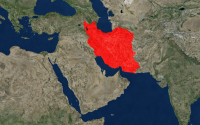22 August 2006Doug Struck
Israeli Prime Minister Ehud Olmert on Monday ruled out peace negotiations with Syria and rejected criticisms of the Lebanon war as reserve soldiers expanded their protests over the government's handling of the conflict.
"We don't have a lot of time to talk about what happened. We have to talk about what will happen," Olmert said. His government has faced growing criticism and calls for investigations into the conduct of the 33-day conflict.
More than 100 protesters, many of them Israeli reservists, staged a demonstration Monday in Jerusalem over shortfalls in the army operation. Another group of paratroops addressed an open letter in the Haaretz newspaper to Olmert, complaining about indecisiveness in the military's top ranks. Hundreds of soldiers signed the letter.
"I won't be part of this game of self-flagellation," Olmert responded as he toured Kiryat Shemona, a northern border town hit repeatedly by Hezbollah rockets during the war.
Olmert suggested that he does not want a formal judicial inquiry, which the Knesset, Israel's parliament, is demanding. Defense Minister Amir Peretz has reportedly appointed an investigating committee to review the war, but various political leaders are calling for an outside, independent commission of inquiry.
"What are we going to do now?" Olmert said. "Stand them in a line and give them a slap on the face? Try them? Put them in front of commissions of inquiry each and every day, so they won't be able to properly assess the next conflict?"
Many of the complaints have been directed at Olmert and Peretz for a war plan that critics say was disorganized and relied too heavily on intensive air bombing in Lebanon. Reserve soldiers who returned from the war also have complained of disorganization in the officer ranks and missing supplies.
The letter from the reservists argued that policymakers got "cold feet" and left the soldiers in the field, directionless. Since the cease-fire began a week ago, soldiers have given accounts of orders that were unclear or contradicted, of operations postponed and postponed again, and of having to forage for food, water and equipment.
"The management of the war," the reservists wrote in the public letter, "caused us to feel that they were spitting in our face."
Moshe Muskal, the father of an Israeli soldier killed at the start of the war, is organizing a protest among parents of slain soldiers to demand Olmert's resignation. "He must bear the responsibility," Muskal said.
Olmert's government has argued that the operation in southern Lebanon was a military success: It seriously damaged Hezbollah, a militant Shiite Muslim movement, and forced Lebanese troops to move into southern Lebanon.
But the public mood in Israel remains sour, and Olmert has been battling the perception that the war highlighted Israel's weaknesses. The military failed to stop the Katyusha rocket attacks on Israel, did not oust Hezbollah and did not win the return of two Israeli soldiers seized July 12 by Hezbollah guerrillas in the incident that sparked the war.
Olmert also defended his foreign policy in response to suggestions by critics and his political allies that a shift in tactics is needed.
In Olmert's cabinet, Public Security Minister Avi Dichter said Monday that Israel ought to restart the negotiations with Syria that ended in 2000. Since the fighting in Lebanon, there has been increasing public debate over whether to seek a deal with Syria that would bring peace to the border and help isolate Iran.
"What we did with Egypt and Jordan is also legitimate in this case," Dichter said in an interview with Israel's Army Radio, referring to peace agreements reached with those Arab countries. A peace deal with Syria would involve Syria's demands for a return of the Golan Heights, which it lost in 1967.
"Before we negotiate with Syria, they should stop financing terror," Olmert said on his tour of the north. He went on, referring to the Syrian president and the militant Islamic group now in charge of Palestinian ministries: "Before we negotiate with Bashar Assad, let him stop launching missiles by means of Hezbollah onto the heads of innocent Israelis. And before we sit down to negotiate, let them stop funding Hamas murder, sabotage and terror. If they meet all these tests, we shall negotiate with them."
He added: "The antitank weapons which took the lives of very many of our soldiers were supplied by Syria. I can tell you Syria is a committed, aggressive member of the axis of evil."
Late Monday, an Israeli military spokesman said soldiers shot and wounded three armed men who approached an Israeli post in southern Lebanon. Hezbollah denied that any of its fighters were hit. About 8,000 Israeli troops remain in southern Lebanon, and Israel says they will remain until the Lebanese army and an international peacekeeping force take control.
http://www.washingtonpost.com/wp-dyn/content/article/2006/08/21/AR2006082101303.html?nav=rss_world






